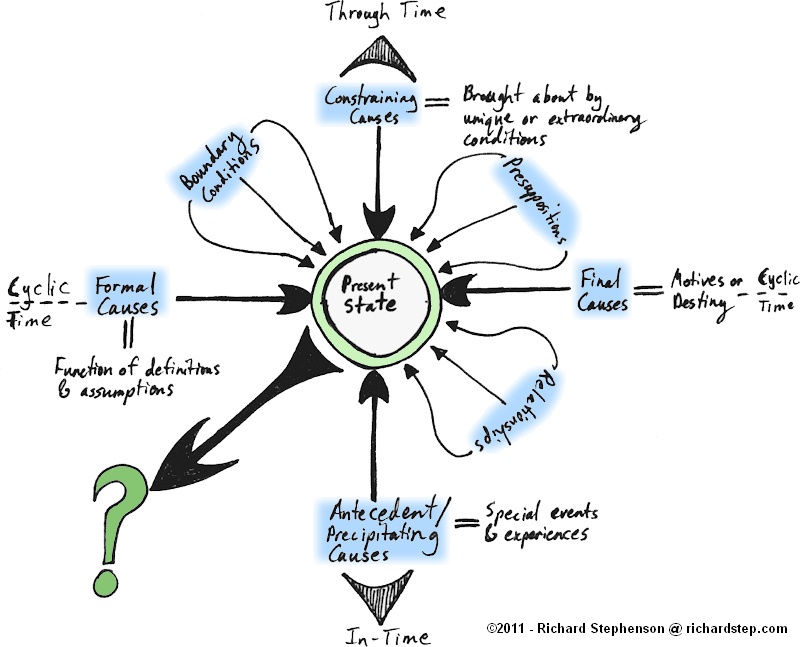
There are always four of them pointing back at you… be careful!
A person’s present state of existence is unknown, at any given time. Or maybe better stated: “You don’t know jack about anyone. Period.”
How many times a day do you influence someone’s behavior in some fashion, whether you know it immediately or not, without knowing ALL aspects of their situation? I can confidently say – ALL THE TIME – EVERY TIME. Having a hard time believing this or saying to yourself, “Pffft – this dude’s a know-nothing weirdo.” Please, read on.
Let me turn the tables a bit to bring up the converse… how many times a day does something someone else says or does to you influence your behavior or decisions? I’m going to go out on a limb and guess “all the time” again. Yes, yes, there are specific times and people we’ve learned how to deal with (is it because they are special cases?), but I am speaking on a more general level. Read on, I beg you. Oh and a hint: they aren’t “special cases”… you’ve already figured it out, you just aren’t applying it to the rest of your life.
Oh and if you don’t care about all of the gooble-dee-gook – skip to the last paragraph for the “take-away”.
Ecology? I thought that was about the environment?
Sure sure, ecology is defined as the following in more broad terms: “The study of the interaction of people with their environment” …more specifically I am talking about the psychological / neuro-semantic use of the term. That is, how does the decision, event, thought, or happening at hand affect you, others, and the world. How does EVENT X impact other stuff? A question that should be answered a LOT more thoroughly than it usually is.
Before we get to the graph – let’s get something straight.
There are at least 4 major causes and 3 major influencers that affect the instantaneous existence of ALL people, decisions, places, items, what-have-you – the current state. Like, the square you are currently standing in the game four-squares… a discrete position in the sequence of events we call ‘Time’.

So much goes into determining anyone’s current state of being – use this information to strengthen your confidence! (Click for a larger version)
4 Major Causes that Impact the Current State:
- Formal Causes: those causes that are functions of ‘definitions’ and ‘assumptions’ – those labels we attach to things and stop thinking about
- Constraining Causes: those causes that are brought about by unique or extraordinary conditions – like bad weather or being mugged
- Antecedent Causes: also known as Precipitating causes – those causes that are based on special events or experiences – a genetic flaw that makes you have 18 fingers
- Final Causes: these are causes related to motives or a sense of destiny – the reason something is done (e.g. – you work for world peace)
3 Major Influencers that Impact the Current State:
- Boundary Conditions: conditions that must be true for all instances of an occurrence in a given event – e.g. triangles always have 3 sides
- Presuppositions: assumptions that aren’t overtly stated but are necessary for a statement to be understood – e.g. inside jokes when with other people
- Relationships: how the item, person, or event is related to other factors – e.g. rapport between people
One cannot truly understand the Present State of any person or decision without having considered all possibilities for all of the 7 conditions listed above. But guess what? This momentous task can NEVER be fully completed by anyone! Sure, we can get close and have a “good grasp” on the situation, but at any given point along a path of making a decision… one simply stops trying to understand, makes assumptions, and moves forward.
And rightly so! Granted, the better we understand a situation, the better we can work with the task at hand. However, we could spend the rest of our lives trying to evaluate a singular event and never reach a set of statements that capture a full understanding of that event. Paralysis by analysis, so to speak.
Judge Not, for the Ecology of the Present State is Unknown
So what? Exactly! So what!!! How could we use this bit of information to strengthen our resolve, fortify our mettle, and bullet-proof our self-confidence?
Easy. You now know you know less-than-everything about your personal something. This is true for ALL somethings. And if you know less-than-everything about your own personal something, then all others know even LESS about your something. So whatever they say, feel, or imply may or may not be useful – you decide.
Your internal criticism is only as worthwhile as you choose it to be.
Their feedback is only as worthwhile as you want it to be.
Look for the good and apply it. Dismiss and discard all else.
See that your filters are as strong as you choose.
–
Beginning photo by: Sudhamshu